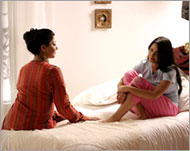Arab films at Cannes tackle taboos
Two contrasting films from the Arab world – an eye-opening documentary about teenage street life in Cairo and the first ever Saudi Arabian feature film – have tackled controversy at the Cannes Film Festival.

El-Banate Dol, or These Girls, by Egyptian director Tahani Rached, profiles five hard-bitten teens from the area known as Qariat al-Amal, or Hope village, in Egypt’s capital.
The images of young Egyptian runaways addicted to drugs, engaging in petty crimes and burdened by extra-marital pregnancy, provide contrasting images to the conservative family lifestyle known to the Middle East, drawing tears from some in attendance.
“These are beautiful girls, full of energy and talent. Not to allow them to develop as human beings is a loss for all of us, because they are fantastic people,” Rached told Aljazeera.net.
The director spent five months becoming familiar with her subjects before filming, allowing them to go about their daily lives.
Unwed mothers
Testimonials of glue-sniffing, rape and eventual prostitution carry on while a barefoot child plays on the dirty pavement.
Abir, one of the profiled girls, is unsure who the toddler’s father is.
Unmarried, she cannot apply for a birth certificate, making him “nobody to the government.”
Nearby, her friend’s newborn sleeps in a styrofoam box.
 |
|
Keif Alhal is Saudi Arabia’s |
“[Their] humanity is still so strong and alive, though the situation is very tough. That is so uplifting,” says Rached.
“If I was born in their situation, I don’t know if I could be that strong.”
Rached maintains the film is not criticism of her government, but rather a candid look at the lives of homeless youth found in all big cities, including those in the Middle East.
“If some people dislike the film because of what they see superficially, that would hurt me because I love them,” she said.
The film has created a buzz in Egypt and there are fears it could end up on the editing room floor if government censors have their way.
To bypass the censors’ snippet, the producers are showing the film at free screenings in Egypt.
A Saudi first
Billed as a romantic comedy, Saudi Arabia’s Keif Alhal (How are You), is the first feature film from the conservative kingdom and pushes the limits on women’s rights, appearing often as a political statement.
Ayman Halawani, the Saudi producer, explained to the standing-room only audience before the screening that “there are a lot of bold elements to the film which may shock people”.
One such element is the unprecedented introduction of a Saudi actress Hind Mohamad, 25, in the role of Duniya, sister of the main character in the film, Sahar.
In Saudi soap operas, actresses were always hired from other Arab countries.
Jordanian actress Mais Hamdan plays the role of wealthy debutante Sahar, who is shown unveiled in scenes throughout the film, another first for Saudi productions.
The film grapples with controversial subjects, often taboo, in Saudi society such as Sahar’s secret romance with her West-leaning cousin.
The film also shows Saudi women driving in the desert far away from the peering eyes of the religious police.
Women in Saudi Arabia are forbidden to drive.
Progressive?
At the same time, the characters mostly come off as progressive – something the US-educated Halwani wanted to put on display to the West.
“We are big backers of women’s rights in the Kingdom,” Halawani says.
‘If we change things one inch, that is a huge achievement,” director Izidore Musallam told Aljazeera.net.
While there are no cinema halls in Saudi Arabia, the film will be shown at cinemas in neighbouring Gulf countries, “so that Saudis can see it on vacation”.
The film will be sold in DVD format in Saudi Arabia later this year.
The film was shot in Dubai with a budget of $1 million and produced by Saudi media company Rotana.